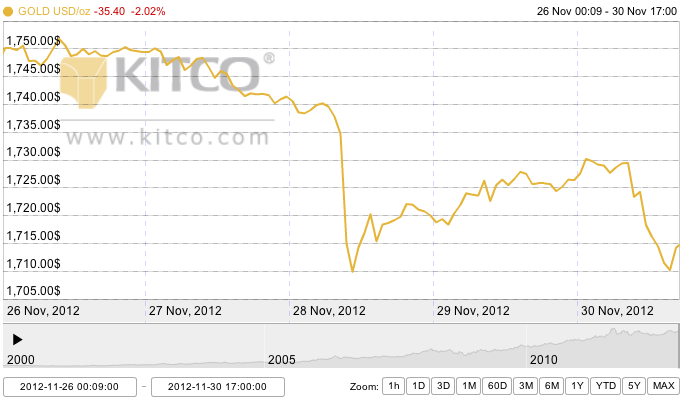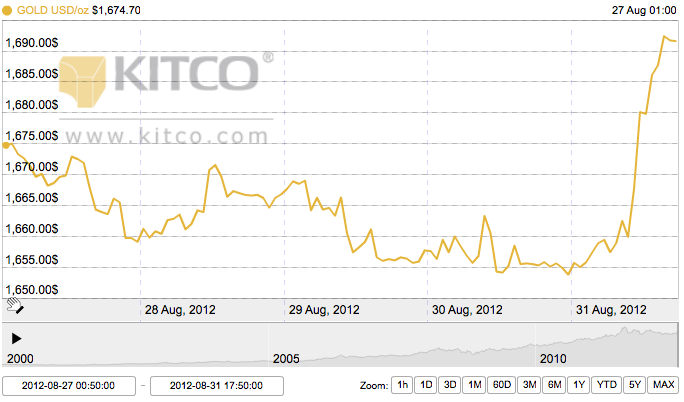Monday Open: $1,750.10
Weekly High: $1,751.80
Weekly Low: $1,709.90
Friday Close: $1,714.70
Gold took a striking dip mid-week but regained losses to end the month with slight gains for November. Still hovering in the $1,700 to $1,750 range, Wednesday was the most peculiar day of the week with a quick plethora of nearly unaccounted for sell-offs, but this still did not force the price down below $1,700.
Monday opened solid and stayed solid. Low volatility in all commodities markets did not affect the price of gold.
Tuesday took a slight dip from further announcements in the U.S. regarding the fiscal cliff approaching at the end of the year. If Democrats and Republicans don’t reach a fiscal agreement by December 30, an automatic $600 billion tax hike and spending freeze motion will go into affect, which could spur the economy into a recession. House of Representatives speaker John Boehner said no substantive progress has been made. However, the little amount of trading on gold due to this news indicates most gold traders believe the crisis will be resolved.
In Tuesday’s European news, a decision was made regarding Greece’s bailout money. Greece will receive a loan with the stipulation that the country will cut its debt/GDP ratio to 124% by 2020. This agreement is likely to raise the value of the euro.
The marketplace didn’t respond to either of these events on Tuesday, but Wednesday morning, one minute after trading opened, a massive sell-off occurred in gold, dropping the price nearly $30 in less than five minutes. Both the U.S. fiscal cliff and Greece’s bailout are bearish for gold, which could reasonably cause a decline in price, but the real impetus for such an immediate loss is the high volume of “sell stop” orders. These orders are automatically programmed to sell off shares once a certain price is reached – in this case, $1,730 for many traders. The bearish pull-out of the market accelerated these automatic sell-stops to result in a drastic price drop for gold, which landed at the lowest price of week, $1,710.
Dave Meger of Vision Financial Markets, pinpointed a new sell-stop number: “The new number to focus on is $1,692—that’s the 100-day moving average,” he said.
Still, the strong selling pressure on Wednesday, which caused quite a buzz, didn’t last. Gold rebounded on Thursday from bargain hunting and short covering. The Wall Street Journal reported on Wednesday that the December FOMC meeting is likely to produce more economic stimulus, which is positive for gold. The dollar was also lower on Thursday.
Friday ended lower again, the price of gold influenced by events earlier in the week that may have made traders skittish. Still, November ended with modest gains.

